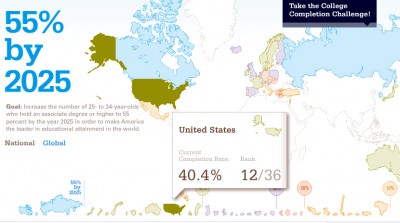There was a time when the U.S. could boast it had the highest percentage of its adult population aged 25-34 with college degrees, but it’s been a long time since anyone could make that claim. Lately, there’s been a great deal of attention focused on the need to ramp up the number of college graduates, and a report released on Thursday by the College Board came with a statistic that is intended to create alarm: We are now twelfth.

Click on the map to see how the U.S. stacks up against the rest of the world with the College Board's interactive graphic.
The lagging college graduation rates have not gone unnoticed by President Barack Obama, who has repeatedly called for more Americans to get postsecondary degrees, including an additional five million community college degrees and certificates by 2020 via his American Graduation Initiative. The low number of college graduates is worrisome at a time when there’s a wide disparity in the skills needed in a tough economy vs. the number of workers who have the education and training to fill them, according to a report released earlier this month by the Georgetown University Center on Education and the Workforce.
Last week, governors joined the college-completion chorus, led by Gov. Joe Manchin III of West Virginia, who said he would make increasing the number of college graduates states produce a focus of his term as chair of the National Governors Association.
In March, a new coalition known as Complete College America was announced with a mission of “dramatically increasing the nation’s college completion rate,” with backing from five foundations.
As Doug Lederman of InsideHigherEd noted recently, an endless stream of reports has been pushing the U.S. to regain its number one status by churning out significantly more college graduates.
“Those who’ve watched the parade of foundations, higher education groups, and other organizations start their own completion initiatives, backed by the Obama administration’s own rhetorical and financial might, might be wondering: Really? This is what the the world really needs — another one?” Lederman asked.
So let’s take a look at the College Completion Agenda 2010 Progress Report released on Thursday. What’s new here? The report says Canada is now number one in the percentage of young adults who hold an associate’s degree or higher (55.8 percent), compared to just 40.4 percent in the U.S. The report was presented to Capital Hill policymakers on Thursday, a Washington Post story noted.
“I don’t think what we’re saying and what the president’s saying are that different,” Gaston Caperton, president of the College Board, told The Post.
One difference, though, is the timetable for progress. The College Board set a goal of 2025 to meet the goal — five years longer than the one set by the president.
In addition, the commission behind the report put 10 specific action items on the agenda to help solve the problem — ranging from universal pre-kindergarten for low-income families to better college counseling.
A new wrinkle will be added to the discussion once the Obama administration issues new regulations for the for-profit school industry, which supporters say are key players in helping the U.S. reach its goal of producing more college graduates. The schools have been under fire, though, for saddling students with lots of debt.
Together with William “Brit” Kirwan, the chancellor of the University System of Maryland, Caperton fielded questions on the College Board report from USA Today’s Mary Beth Marklein.




